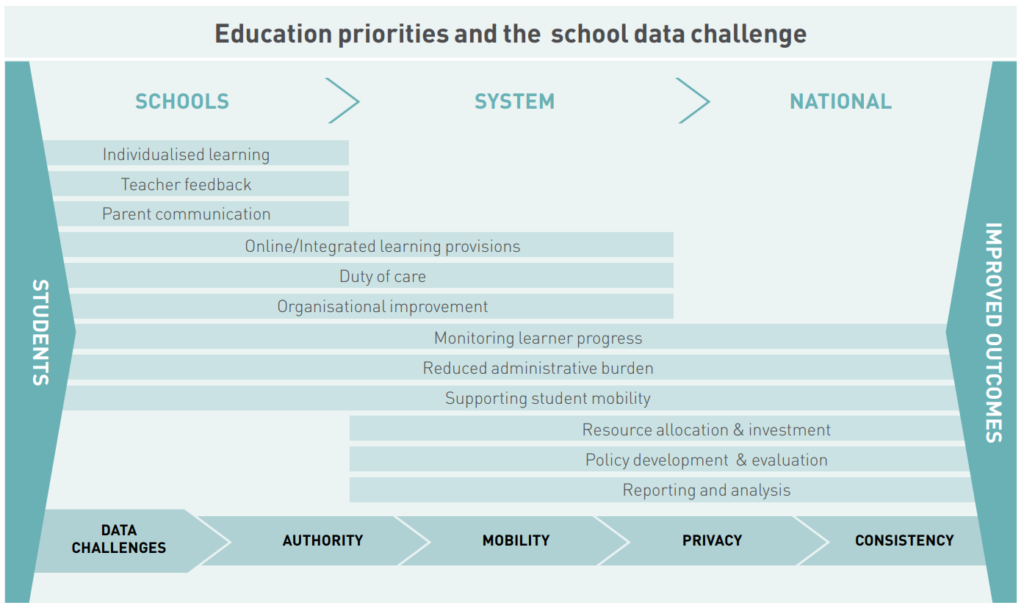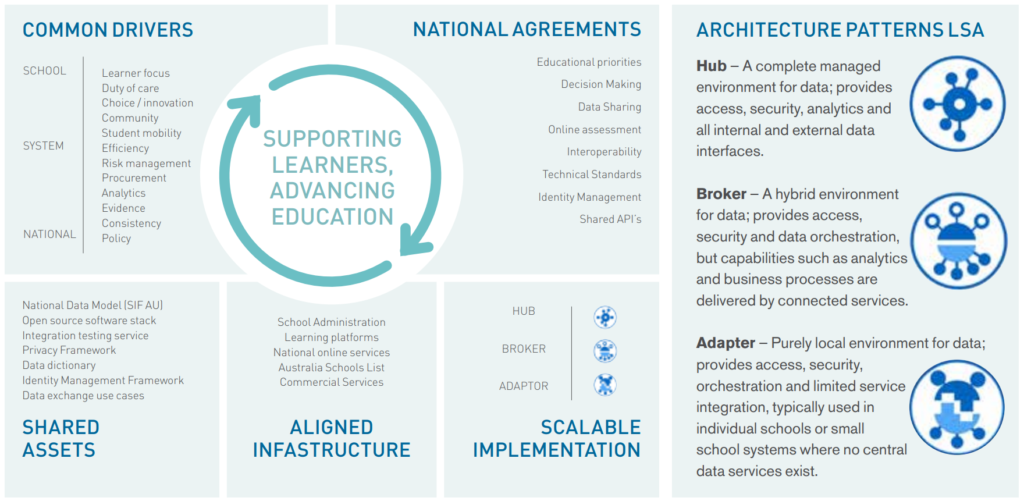Learning Services Architecture
The Need and Opportunity
Schools know that to create the best outcomes for their learners they need to have as much good quality data about learners and the learning process as possible. The number of sources of that data increases every day as schools use new tools and services online.
Supporting students in their journey through schooling also means sharing information with other schools, school authorities and service providers. The ability to share data safely with parents and students is paramount.
With so much information flowing through schools, the key need is that all information about a learner can be brought together in the right place at the right time for the maximum benefit. However, managing all that data is difficult, schools need the benefits not the headache of being IT architects.

The Learning Services Architecture
The Learning Services Architecture (LSA) is a nationally coordinated response to this challenge. The Australian education community has responded to the opportunities and challenges presented by the explosion of technology in education with a national architectural approach based on established policy agreements and interoperability standards agreed jointly by education authorities and education IT companies. The LSA exists to simplify the delivery of learning services and to ensure that education data can be used and re-used consistently in schools, school systems and nationally.
What is the LSA?
An agreed national approach for integrating information systems that exchange data about learners in schools, ensuring that they work together effectively and safely.
The Benefits of the LSA
Schools benefit from:
- a unified view of information about a learner
- reduced administrative burden for teachers
- procurement flexibility and choice
School Systems benefit from:
- consistent, well-managed school data
- enabling rich decision-support and analytics
- consistent approaches to managing information privacy and risks
- common approach to service integration
Education Solution Providers benefit from:
- a nationally consistent integration interface
- market choice by schools
- nationally agreed school business use cases – common ways of doing core school processes that use student data

Making it Real - National Use Cases
Australian school authorities are progressively implementing ICT infrastructure employing nationally agreed data interoperability standards. This approach has been pioneered in New South Wales where schools are able to select products that meet their local needs and integrate these with core data systems via an integration hub. School authorities in other jurisdictions are now following this lead using a range of implementation patterns described in the LSA.
New national learning infrastructure such as the national online assessment platform to be used for NAPLAN Online and the Australian Schools List are being designed to integrate with stakeholder systems using interoperability standards from the LSA.
NSIP has developed National Data Exchange Use Cases in conjunction with school authorities and solution providers to ensure alignment with the real world of school operations and to take full advantage of the national interoperability standards. Use Cases have been defined to support solutions that perform core data exchanges including:
- Enrolment
- Attendance
- Timetable
- Grading
- Finance
- NAPLAN registration
This list of Use Cases is growing and in the near future will include Wellbeing and Assessment. Choosing systems that are aligned to the LSA provides confidence that they will work together to provide quality data about students now and into the future. NSIP ensures that providers involved in data exchange have the technical tools and training to ensure their systems are interoperable.
How to get involved?
Government schools:
- Contact NSIP to be put in touch with the Department and supplier contacts in your location. LSA-based systems are available or under implementation in all States and Territories.
Catholic or Independent schools:
- Contact NSIP to be put in touch with authority or suppliers contacts in your location. LSA-based solutions are being developed for non-government schools in Tasmania, Queensland, Victoria and Western Australia.
NSIP is working with Education Services Australia to provide LSA compliant support for the independent section nationally.
If you are working in any school with a systems provider and would like to know how NSIP can help them to be part of the LSA, please contact us. NSIP provides tools, training and advice to help all solution vendors participate in the LSA.
If you want to know more about the LSA, who is implementing it in your sector, or who your suppliers should talk to so they can be part of this national initiative please contact us.